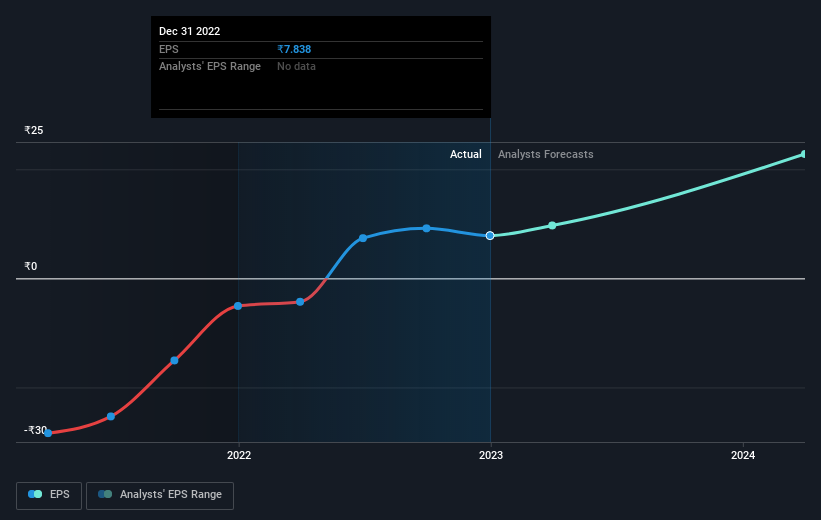- India
- /
- General Merchandise and Department Stores
- /
- NSEI:SHOPERSTOP
While shareholders of Shoppers Stop (NSE:SHOPERSTOP) are in the black over 3 years, those who bought a week ago aren't so fortunate

While Shoppers Stop Limited (NSE:SHOPERSTOP) shareholders are probably generally happy, the stock hasn't had particularly good run recently, with the share price falling 15% in the last quarter. But that doesn't change the fact that the returns over the last three years have been very strong. In fact, the share price is up a full 209% compared to three years ago. After a run like that some may not be surprised to see prices moderate. The thing to consider is whether the underlying business is doing well enough to support the current price.
Although Shoppers Stop has shed ₹5.4b from its market cap this week, let's take a look at its longer term fundamental trends and see if they've driven returns.
See our latest analysis for Shoppers Stop
In his essay The Superinvestors of Graham-and-Doddsville Warren Buffett described how share prices do not always rationally reflect the value of a business. By comparing earnings per share (EPS) and share price changes over time, we can get a feel for how investor attitudes to a company have morphed over time.
During three years of share price growth, Shoppers Stop moved from a loss to profitability. Given the importance of this milestone, it's not overly surprising that the share price has increased strongly.
You can see below how EPS has changed over time (discover the exact values by clicking on the image).

We know that Shoppers Stop has improved its bottom line over the last three years, but what does the future have in store? If you are thinking of buying or selling Shoppers Stop stock, you should check out this FREE detailed report on its balance sheet.
What About The Total Shareholder Return (TSR)?
We've already covered Shoppers Stop's share price action, but we should also mention its total shareholder return (TSR). The TSR attempts to capture the value of dividends (as if they were reinvested) as well as any spin-offs or discounted capital raisings offered to shareholders. Dividends have been really beneficial for Shoppers Stop shareholders, and that cash payout contributed to why its TSR of 226%, over the last 3 years, is better than the share price return.
A Different Perspective
It's good to see that Shoppers Stop has rewarded shareholders with a total shareholder return of 32% in the last twelve months. Since the one-year TSR is better than the five-year TSR (the latter coming in at 1.5% per year), it would seem that the stock's performance has improved in recent times. Given the share price momentum remains strong, it might be worth taking a closer look at the stock, lest you miss an opportunity. I find it very interesting to look at share price over the long term as a proxy for business performance. But to truly gain insight, we need to consider other information, too. Even so, be aware that Shoppers Stop is showing 3 warning signs in our investment analysis , and 1 of those is significant...
If you are like me, then you will not want to miss this free list of growing companies that insiders are buying.
Please note, the market returns quoted in this article reflect the market weighted average returns of stocks that currently trade on Indian exchanges.
New: Manage All Your Stock Portfolios in One Place
We've created the ultimate portfolio companion for stock investors, and it's free.
• Connect an unlimited number of Portfolios and see your total in one currency
• Be alerted to new Warning Signs or Risks via email or mobile
• Track the Fair Value of your stocks
Have feedback on this article? Concerned about the content? Get in touch with us directly. Alternatively, email editorial-team (at) simplywallst.com.
This article by Simply Wall St is general in nature. We provide commentary based on historical data and analyst forecasts only using an unbiased methodology and our articles are not intended to be financial advice. It does not constitute a recommendation to buy or sell any stock, and does not take account of your objectives, or your financial situation. We aim to bring you long-term focused analysis driven by fundamental data. Note that our analysis may not factor in the latest price-sensitive company announcements or qualitative material. Simply Wall St has no position in any stocks mentioned.
About NSEI:SHOPERSTOP
Shoppers Stop
Engages in the retail of various household and consumer products through retail and departmental stores in India.
High growth potential and slightly overvalued.
Similar Companies
Market Insights
Community Narratives



